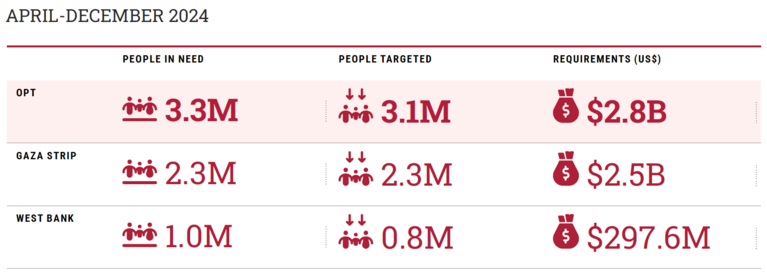Flash Appeal for the Occupied Palestinian Territory 2024
Introduction
This Occupied Palestinian Territory (OPT) Flash Appeal calls for US$2.822 billion for UN Agencies, INGO, and NGO partners to address the most urgent needs of more than three million people in the Gaza Strip (Gaza) and the West Bank, including East Jerusalem, covering a 9-month period from April through December 2024.
This document is the successor to the Flash Appeal for the Occupied Palestinian Territory (OPT) originally published on 12 October 2023. The first revision was published in early November 2023 and extended through March 2024.
The Flash Appeal outlines the estimated resource requirements to reduce human suffering and prevent further loss of life in Gaza and the West Bank based on the best available information at this time. The $2.822 billion requested represents only part of the $4.089 billion that the UN and partners estimates is required to meet the needs of the 3.3 million people in need. It reflects what the Humanitarian Country Team foresees as most likely to be implementable over the coming nine months, assuming for the short term, namely the next quarter, many of the current security concerns and access limitations will continue. It also does not include the cost of fuel, which is no longer being provided through external funding. We have also assumed that the efforts to implement Security Council Resolution 2720 (2023) will bear fruit during 2024.
UNRWA plays a unique role in OPT, serving as a key service provider and the backbone of the humanitarian response in Gaza. Two thirds of the population of Gaza, 1.6 million people, are Palestine refugees registered with UNRWA; in times of emergency, the Agency’s support is extended to the broader population. The Agency has more than 13,000 staff in Gaza, over 3,500 of whom are engaged in the emergency response. In the West Bank, UNRWA serves 1.1 million Palestine refugees and other registered persons, of whom 890,000 are refugees. UNRWA is part of the humanitarian architecture in OPT and fully integrated into the humanitarian cluster system. Their requirements are included in this appeal.
The magnitude of this response and operational constraints are beyond what has been seen before in OPT and in other contexts. Long term planning is not feasible, however short-term operational plans have been developed for Gaza, outlining different scenarios, and will be developed for the West Bank.
The overall vision laid out in this appeal requires critical changes in the operating environment notably regarding access by personnel and of goods, and security, and funding must be timely and flexible to allow humanitarian actors to adapt programming to a highly dynamic context.










